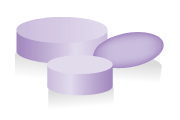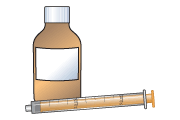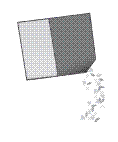Senna for constipation
This leaflet is for parents and carers about how to use this medicine in children. Our information may differ from that provided by the manufacturers, because their information usually relates to adults. Read this leaflet carefully. Keep it somewhere safe so that you can read it again.
Do not give Senna if your child is constantly vomiting when constipated, as it could be a sign of obstruction (a block in their bowels caused by a build-up of poo). Contact your doctor for advice straight away.
Name of medicine
Senna
Brand names: Manevac, Senokot
Why is it important for my child to take Senna?
When a child is constipated, their stools (poo) are hard and painful to pass. Sometimes a child may try to hold the stool in because of previous pain when going to the toilet . Constipation can also make the child feel quite poorly. Your doctor will probably prescribe a type of medicine called an osmotic laxative (e.g. lactulose, polyethylene glycol [Laxido, Movicol]) to give to your child first. This will soften the stool (poo). Senna is then used to help your child to pass the softened stool.
It is important that your child takes senna regularly, as it may take some time for the constipation to get better.
- You can find more information about constipation in children and young people produced by NICE (National Institute for Health and Care Excellence).
What is Senna available as?
- Tablets: 7.5 mg
- Granules: 400 g; these contain sugar
- Liquid medicine: 7.5 mg in 5 mL
When should I give Senna
Senna is usually given once each day. You can give it either before the evening meal (which should help your child to do a poo in the morning), or in the morning (before breakfast).
Give the medicine at about the same time(s) each day so that this becomes part of your child’s daily routine, which will help you to remember.
How much should I give?
Your doctor will work out the amount of Senna (the dose) that is right for your child. The dose will be shown on the medicine label.
It is important that you follow your doctor’s instructions about how much to give.
How should I give Senna?

Tablets
- Tablets should be swallowed with a glass of water, squash or juice. Your child should not chew the tablet.

Liquid medicine
- Shake the medicine well.
- Measure out the right amount using an oral syringe or a medicine spoon. You can get these from your pharmacist. Do not use a kitchen teaspoon as it will not give the right amount.

Granules
- Mix the granules into a cold or warm drink. Your child should swallow it all straight away. (The granules will swell when they come into contact with the liquid, so the mixture should be drunk straight away.) If you prefer, you can sprinkle the granules onto a small amount of food (such as yogurt, mashed potato, or jam). Your child should drink a full glass of water afterwards.
When should the medicine start working?
Your child should be able to do a poo 8–12 hours after taking a dose of senna. However, if the constipation is bad, it may be a few days before they do a poo. Continue to give the medicine each day. Your child should not strain to do a poo.
What if my child is sick (vomits)?
- If your child is sick less than 30 minutes after having a dose of Senna, give them the same dose again.
- If your child is sick more than 30 minutes after having a dose of Senna, do not give them another dose. Wait until the next normal dose.
If your child is sick again, seek advice from your family doctor, nurse, pharmacist, or hospital. They will decide what to do based on your child’s condition and the specific medicine involved.
What if I forget to give it?
If you usually give it once a day in the morning: Give the missed dose when you remember during the day, as long as this is at least 12 hours before the next dose is due.
If you usually give it once a day in the evening: If you remember before bedtime, give the missed dose. You do not need to wake a sleeping child to give a missed dose. You can give the missed dose in the morning, as long as this is at least 12 hours before the evening dose is due.
What if I give too much?
If you give too much Senna, your child may get stomach ache or diarrhoea.
If you think you may have given your child too much Senna, contact your doctor or local NHS services (details at end of leaflet). Have the medicine or packaging with you if you telephone for advice.
Are there any possible side effects?
We use medicines to make our children better, but sometimes they have other effects that we don’t want (side-effects).
- Your child may get stomach cramps. This usually wears off after a few doses. If it is still a problem when your child has been taking Senna for a week, contact your doctor.
- If your child gets diarrhoea, contact your doctor, as they may want to reduce the dose of senna.
- If your child has bad or watery diarrhoea, or seems tired and weak, contact your doctor.
There may sometimes be other side effects that are not listed above. If you notice anything unusual and are concerned, contact your doctor. You can report any suspected side effects to a UK safety scheme at mhra.gov.uk/yellowcard
Can other medicines be given at the same time as Senna?
- You can give your child medicines that contain paracetamol or ibuprofen, unless your doctor has told you not to.
- Senna should not be taken with some medicines. Tell your doctor or pharmacist about any other medicines your child is taking before giving Senna.
Check with your doctor or pharmacist before giving any other medicines to your child. This includes herbal and complementary medicines.
Is there anything else I need to know about this medicine?
Do not give Senna without plenty of water. It will not work properly and you risk causing dehydration.
- Senna belongs to a group of drugs called stimulant laxatives. Before giving senna, it is important to soften your child’s stools. You can do this by increasing the amount of high-fibre foods such as fruit, vegetables, bran and high-fibre cereals that they eat, and encouraging them to drink plenty of water. Or you might have been prescribed an osmotic laxative – another type of laxative that works by softening the stools.
- Encouraging your child to be active will also help their constipation. Your pharmacist, doctor or health visitor will be able to give you advice and support.
General advice about medicines
- Try to give medicines at about the same times each day, to help you remember.
- Only give this medicine to your child. Never give it to anyone else, even if their condition appears to be the same, as this could do harm.
- If you think someone else may have taken the medicine by accident, contact your doctor or NHS local services (details at end of leaflet) for advice.
- Make sure that the medicines you have at home have not reached the ‘use by’ date on the packaging. Give old medicines to your pharmacist to dispose of.
Where should I keep this medicine?
- Keep the medicine in a cupboard, away from heat and direct sunlight.
- It does not need to be kept in the fridge.
- Make sure that children cannot see or reach the medicine.
- Keep the medicine in the container it came in.
Who to contact for more information?
Your child’s doctor, pharmacist or nurse will be able to give you more information about Senna and about other ways to treat constipation.
England: NHS 111
Tel 111
www.nhs.ukScotland: NHS 24
Tel 111
www.nhs24.scotNorthern Ireland: NI Direct
Wales: NHS 111 Wales
Tel 111
www.111.wales.nhs.ukERIC: The Children's Bowel and Bladder Charity
0808 169 9949
www.eric.org.uk/Pages/Category/bowel-problemsNICE - Information for parents and carers about constipation
Copyright disclaimer
Version [2]. © NPPG, RCPCH and WellChild, all rights reserved. Review by June 2017.
The primary source for the information in this leaflet is the British National Formulary for Children. For details on any other sources used for this leaflet, please contact us through our website, www.medicinesforchildren.org.uk.
We take great care to make sure that the information in this leaflet is correct and up-to-date. However, medicines can be used in different ways for different patients. It is important that you ask the advice of your doctor or pharmacist if you are not sure about something. This leaflet is about the use of these medicines in the UK, and may not apply to other countries. The Royal College of Paediatrics and Child Health (RCPCH), the Neonatal and Paediatric Pharmacists Group (NPPG), WellChild and the contributors and editors cannot be held responsible for the accuracy of information, omissions of information, or any actions that may be taken as a consequence of reading this leaflet.
